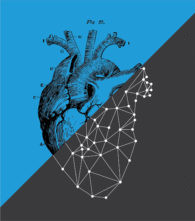Introduction
We are Valeria Pannunzio and Carolina Falcão; Valeria is a PhD researcher working in the CardioLab at the Delft University of Technology, while Carolina is a master student in Strategic Product Design at the Delft University of Technology. We are conducting a research study, which we invite you to join as a participant.
Purpose
The purpose of this research study is to explore emerging blood pressure self-tracking practices among early adopters of self-tracking technology. We aim to employ the findings of this study by informing user-centered innovation in the field of cardiovascular prevention. Understanding the interests and preferences of self-trackers is fundamental for developing meaningful blood pressure self-tracking solutions, which in turn may enable valuable progresses in cardiovascular prevention practice.
If you agree to be in this study, you will be asked to do the following:
Before you begin the main part of the study:
In order to participate in the study, you must be older than eighteen years, hold an interest or curiosity towards blood pressure as a personal data point, and have an iPhone or Android smart phone. In case you agree to participate in the study and sign the informed consent form, we will ask for your name, age, email, self-tracking background, interest towards blood pressure, phone number, and ask you if you have an iphone or an android phone (which are necessary for participation).
During the main part of the study:
Participation in the research study involves self-tracking through a non-invasive blood pressure monitor device, the Omron RS7 Intelli IT. The device, which will be provided to you by the researchers, consists in a cuff to be worn on the wrist which does not require charging, and is paired with an app called Omron Connect. The device collects blood pressure (systolic and diastolic) and heart rate data. Please review the Omron Connect Terms of Use before signing the informed consent form (https://omronhealthcare.com/omron-connect-eula/ for US and Canada, or select your location from https://www.omronconnect.com for Europe).
If you so wish, you will also be provided with another non-invasive self-tracking device, either the Fitbit Charge 2 or 3. The device consists in a wristwatch which does require periodical recharging. The wristwatch is paired with a Fitbit app. The device collects continuous data, including activity, exercise, and sleep data. If you think you may want to request a Fitbit device, please review the Fitbit Terms of Service before signing the informed consent form (https://www.fitbit.com/nl/legal/terms-of-service).
If you so wish, you will be able to share your self-tracked data with the researchers, the rest of the study group, and/or the public. In this case, Open Humans will be used as a self-tracked data repository and exchange platform. Open Humans is an online platform that allows you to upload, connect, and privately store your personal data. If you think you may want to share your self-tracked data with the researchers or the rest of the study group during the study, please read the Open Humans terms of use at: https://www.openhumans.org/terms/ before signing this form. Also, please see the Risks and benefits section of this form for more information on the risks associated with data collection mediated by third parties (Omron, Fitbit and Open Humans).
Finally, participation in the Quantified Heart involves actively sharing your self-tracking experiences, either with the researchers only, or with the rest of the study group (depending on your preferences). This will happen through short online questionnaires followed by either webinars or individual calls (depending on your preferences) that can take place at a time of your choice. Specifically, the short questionnaires, webinars or individual calls will cover your experiences regarding self-tracked data collection, visualization, and usage. Completing questionnaires is expected to take a maximum of 8 minutes per time, while both the webinars and the individual calls are expected to last a maximum of 1 hour per time. The webinars or individual calls will be video recorded to accurately record the information you provide; if you don't wish to continue a webinar or individual call, you may interrupt participation at any time.
The study will be concluded when the self-tracking devices will be collected back by the researchers. No monetary penalty will be imposed in case of device damage or loss, but we do ask to handle the equipment respectfully and to ship it back (free of charge and following researchers’ instructions) at the end of the study.
You are free to withdraw your participation at any time, by simply communicating your wishes to the researchers through your preferred communication channel.
Data management
All of your personal data (such as address and phone numbers) and your self-tracked data collected by the researchers will be stored in a password-protected folder and destroyed at the end of the study. Data concerning your self-tracking experience, including questionnaire responses, webinars and individual calls video records, will be transcribed in anonymized form and the video recordings destroyed at the end of the study. The transcripts will be stored for scientific publications and archived in the 4TU. Centre for research data institutional repository. You will retain the right to access, rectify and erase transcribed data (questionnaire responses, webinars or individual calls records) by simply sending a mail request to the researchers.
Study location
All study procedures will be self-administered by you, the participant. Communications with the researchers will happen through online channels.
Risks and benefits
We expect participation in the study to be connected to both potential risks and benefits. Please consider both before signing this form.
The main potential risks we expect to arise from participation are listed as follows;
1. By using any self-tracking device, you may become aware of non-ideal physiological measurements (e.g., high blood pressure). Such discoveries may become a cause for concern and anxiety, resulting in a psychological risk. The Omron and Fitbit devices do not offer diagnoses or medical advice, nor will the researchers; we will always advise you to discuss your concerns with your medical professional of reference. Please think carefully about what potentially sensitive things you might learn about yourself through self-tracking, and only join the study if you believe you are psychologically prepared to these occurrences. Also please keep in mind that the Quantified Heart is not a medical study.
2. The self-tracking devices to be employed in the study are manufactured by private companies which store the collected data in cloud environments, posing a potential data security risk. The terms and conditions of the devices manufacturers (Omron and Fitbit) state that you have the right of erasure and access to personal data, but, as it sometimes happens with private companies, the terms may be changed in the future. In the same way, the self-tracked data repository platform of choice in this study, Open Humans, states in its terms and conditions that you have the right of erasure and access to their personal data and that reasonable measures are taken to ensure data security (such as data anonymization); however, a risk still exist of anonymized data breaches. Please review the terms and conditions of Omron Connect, Fitbit and Open Humans before deciding to participate.
3. Annoyance, discomfort and excessive time burden risks derived from self-tracking activities and from sharing your experiences through short questionnaires, webinars or individual calls. Please keep in mind that you are free to discontinue participation at any point if you experience annoyance, discomfort and excessive time burden.
The main potential benefits we expect to arise from participation are listed as follows;
1. You will be provided high-quality monitoring devices (Omron RS7 Intelli IT, Fitbit) and relevant information material for the entire duration of the study.
2. You will be offered individual support in self-tracked data collection, visualization, and interpretation for the entire duration of the study.
3. You will be able to interact with a group of participants and researchers who share your interest and curiosity towards blood pressure self-tracking.
4. You will retain the possibility to disseminate your experiences and ‘self-discoveries’ in QS meetups or other venues.
If you have questions, concerns, or problems please email the study coordinators at: v.pannunzio@tudelft.nl

